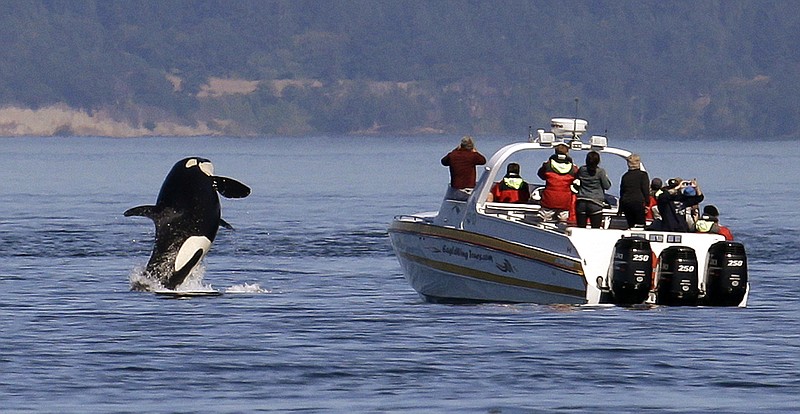SEATTLE (AP) - The federal government is considering a petition that calls for a whale protection zone on the west side of Washington's San Juan Island.
Three groups have asked NOAA Fisheries to establish an area that would restrict most motorized vessels in order to protect endangered southern resident killer whales from noise and other disturbances.
Puget Sound orcas face multiple threats - including pollution, lack of prey and impacts from vessels - but the zone is a common-sense approach that can be implemented immediately, Orca Relief Citizens' Alliance, Center for Biological Diversity and Project Seawolf said in their petition filed in November. These whales depend on natural sounds for foraging, communicating, and navigating, and a zone would provide the animals with more quiet and less disturbance, they said.
NOAA Fisheries said studies indicate that the whales forage less in the presence of boat traffic, and boat noise may disrupt the echolocation clicks the whales use to find food.
The orcas that spend time in the inlands waters of Washington state aren't recovering, years after being listed as endangered in 2005, the groups said. With the loss of seven animals in 2016, the population is down to 78.
"We're looking at every option and every opportunity to address the threats to these whales," Barry Thom, administrator of NOAA Fisheries West Coast Region, said in a statement Thursday. "We're all very concerned about the losses of the last year and we're determined to work with our partners to pursue the action plan and turn that around."
NOAA Fisheries considered a similar no-go zone in 2011 but declined to move forward, citing strong opposition at the time.
"The petition presents an opportunity to revisit that idea and get input from the public on this type of protection for the whale," Lynne Barre, NOAA Fisheries recovery coordinator for the southern resident killer whales, said in a statement.
In 2011, the agency adopted rules requiring boats to stay 200 yards from the whales and out of their path.
But the petitioners say those protections and voluntary measures haven't been sufficient to protect the whales.
They're proposing a zone larger and wider than the one considered in 2011. It would extend three-quarters of a mile offshore of San Juan Island from Mitchell Point in the north to Cattle Pass in the south. They're also asking for an additional ¼-mile buffer to give the whales "more quiet and rest" in their key habitat area and for the rules apply between April 1 to Sept. 30.
NOAA Fisheries is seeking public input as it decides whether to accept the petition and take action.
____
Online:
NOAA Fisheries: http://www.westcoast.fisheries.noaa.gov/protected_species/marine_mammals/killer_whale/vessel_regulations.html
